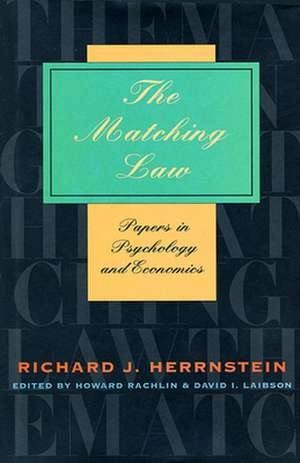The Matching Law – Papers in Psychology & Economics
Autor Richard Herrnsteinen Limba Engleză Paperback – 24 apr 2000
In recent years, the most popular theory of choice behavior has been rational choice theory. Developed and elaborated by economists over the past hundred years, it claims that individuals make choices in such a way as to maximize their well-being or utility under whatever constraints they face; that is, people make the best of their situations. Rational choice theory holds undisputed sway in economics, and has become an important explanatory framework in political science, sociology, and psychology. Nevertheless, its empirical support is thin. The matching law is perhaps the most important competing explanatory account of choice behavior. It views choice not as a single event or an internal process of the organism but as a rate of observable events over time. It states that instead of maximizing utility, the organism allocates its behavior over various activities in exact proportion to the value derived from each activity. It differs subtly but significantly from rational choice theory in its predictions of how people exert self-control, for example, how they decide whether to forgo immediate pleasures for larger but delayed rewards. It provides, through the primrose path hypothesis, a powerful explanation of alcohol and narcotic addiction. It can also be used to explain biological phenomena, such as genetic selection and foraging behavior, as well as economic decision making.
Preț: 327.59 lei
Nou
Puncte Express: 491
Preț estimativ în valută:
62.68€ • 65.80$ • 52.03£
62.68€ • 65.80$ • 52.03£
Carte tipărită la comandă
Livrare economică 10-24 aprilie
Preluare comenzi: 021 569.72.76
Specificații
ISBN-13: 9780674001770
ISBN-10: 067400177X
Pagini: 352
Dimensiuni: 157 x 237 x 18 mm
Greutate: 0.47 kg
Ediția:Revised
Editura: Harvard University Press
ISBN-10: 067400177X
Pagini: 352
Dimensiuni: 157 x 237 x 18 mm
Greutate: 0.47 kg
Ediția:Revised
Editura: Harvard University Press
